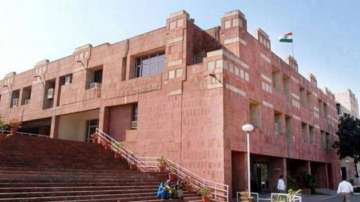Jawaharlal Nehru University (JNU) has told the Delhi High Court that its decision to allocate 100 per cent PhD seats in seven centres to JRF category candidates is a “well-considered policy decision” and does not violate any law or regulation.
The varsity said JRF is one of the most prestigious fellowships awarded to candidates who qualify for an intense competitive examination conducted by the UGC at the national level and therefore, successful candidates have already proven acumen in their respective fields.
“Allocation of 100 per cent PhD seats to JRF category candidates for the academic year 2021-22 in select centres in JNU is a well-considered policy decision made by the highest body of academic experts i.
e the Academic Council in conformity with the UGC guidelines,” said the affidavit filed by JNU in response to the petition filed by Students' Federation of India (SFI), JNU challenging the allocation.
It is asserted that JNU is well within its power to formulate eligibility criteria for admission of candidates in accordance with requirements and in pursuit of excellence.
The court is informed that JNU is gradually moving towards a unified system of admissions, making JRF a benchmark for quality research work in order to enhance the academic environment and standards.
JNU has further argued that the SFI's petition was filed to gain political mileage rather than serving any alleged public interest and does not plead or demonstrate violation of any statutory norms or regulations.
“Petitioner is seeking to dilute a conscious practical decision taken by the highest body of the Respondent, i.e., the Academic Council and unnecessarily raking up a non-issue with electoral undercurrents being the sole motive,” the affidavit said.
JNU has submitted that allowing the relief would derail the entire admission process which would cause prejudice to lakhs of aspirants and since the nature of research is interdisciplinary, no candidate is deprived of the opportunity to appear in the entrance examination for admission into Ph.
D.
programmes being offered by other centres.
SFI, which was represented by advocate Ashok Agarwal, said in its petition that previously, the PhD seats in seven Centres of JNU were filled up through both from JRF category candidates as well as an entrance examination for non-JRF candidates but in the current academic year 2021-22, the university illegally, arbitrarily, unconstitutionally through its e-Prospectus decided to fill-up all PhD seats through JRF category candidates in seven of the centres.
The seven centres are Centre for International Trade and Development; PhD in Human Rights Studies (HRSH); Centre for English Studies; Centre for Indian Languages: PhD in Hindi, Urdu and Hindi Translation; Centre for Study of Law, Governance; Special Centre for Systems Medicine and Centre for Women Studies. Notice in the PIL was issued by a bench headed by Chief Justice DN Patel on July 16. The matter would be heard next on August 20.
READ| CBSE Class 10 Result 2021 declared: See all the important facts here
ALSO READ| Maharashtra HSC Result 2021 declared LIVE UPDATES: Record 99.63% pass percentage; websites, direct link
Latest Education News
